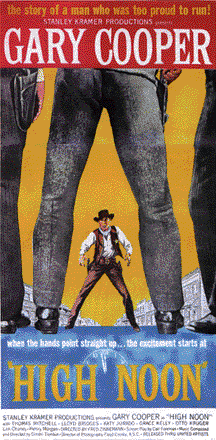Jack A+
Roger Ebert --
IMDB 8.3
 High Noon is a great movie. It is a classic Western with the bad guys coming for the show down with the sheriff. It has a look and feel of a real Old West town.
High Noon is a great movie. It is a classic Western with the bad guys coming for the show down with the sheriff. It has a look and feel of a real Old West town.
High Noon has a really good story but it is much more interesting when we look at it through the McCarthyism lens. The writer, Carl Foreman, had just testified before the HUAC. When he got back he put the finishing touches on the movie (which was adapted from the short story Tin Star).
Carl Foreman has said, "They were either capitulating to these gangsters - political gangsters from out of town - or they were being executed by them here. And I could see that my time was coming sooner or later - it was just being delayed by a couple years or so - and I wanted to write about that. I wanted to write about the death of Hollywood. So all that shaped the writing of High Noon. That was very conscious, see."
According to author Anthony Holden in his book, Behind the Oscar, Foreman "was summoned to Washington - where he took the Fifth Amendment - during the filming of his script for High Noon. Knowing that he would be blacklisted as soon as the film was finished, Foreman arrived back on the set 'frightened but inspired;' he proceeded to write in a number of scenes mirroring the witch-hunt, and attacking America's (and Hollywood's) reluctance to stand up to HUAC's bullying tactics. 'Much that was in the script seemed comparable to what was happening,' he said. Friends had dropped him; people would turn away when they saw him in the street. 'My associates were afraid for themselves - I don't blame them - and tried to get me off the film, unsuccessfully. They went to Gary Cooper and he refused (to go along with them). Fred Zinnemann was very staunch and very loyal, and so was our backer, Bruce Church. There are scenes in the film that are taken from life. The scene in the church is a distillation of meetings I had with partners, associates and lawyers. And there's the scene with the man who offers to help and comes back with his gun and asks, 'Where are the others?' And Cooper says, 'There are no others.' 'I became the Cooper character,' said Foreman. High Noon's producer, Stanley Kramer, joined Cooper and Zinnemann in approving what Foreman was up to. Once the news leaked around town, however, John Wayne and Hedda Hopper were among the first to launch public attacks on Foreman, Hopper urging that 'he never be hired again.' Fearing for his production company, Kramer publicly dissociated himself from the writer, causing a rift between the two men that would last into the 1980s.'
High Noon can stand on its own and still be considered a great movie, but when you add the McCarthyism angle, it becomes very special.
|